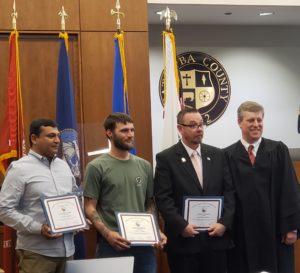The Catawba County Veterans’ Treatment Court (VTC) motto is “Victory Earned Together.” That motto was carried out during a ceremony honoring the first three graduates of the program on Friday, March 3, 2023, at the Catawba County Courthouse.
The ceremony honoring the achievements of Tommy Todd Jr. (U.S. Marines), Prashant Gongidi (U.S. Army) and Tyler Gragg (U.S. Army) took place in a courtroom packed with elected officials, community dignitaries, veterans and other participants of the Catawba VTC in attendance.
36th Prosecutorial District Attorney Scott Reilly said the graduation of the first three VTC participants was an accomplishment that they and others associated with the program could be proud of reaching.
“A veterans’ treatment court gives veterans who have lost their way another chance, and if anyone has earned a second chance, it’s those who have worn the uniform of our country,” Reilly said. “Our goal is that by everyone working together we can make a difference in a veteran’s life and help them get back on the path to becoming productive members of the community again.”
Friday’s ceremony certainly was proof of that.
Todd was described as a role model to others in the program. Gongidi said the VTC saved his life. Gragg wanted a change in his life, a new future. They now have an opportunity to give back to a community that has given to them, just as they did previously with their military service.
VTC Coordinator Jared Weaver acknowledged the support given by the community to make the treatment program for veterans possible and operational, noting that the court started as a vision of Dennis Bennet a decade ago that came to fruition when Reilly made it a campaign priority that became a reality when he took office.
Todd, Gongidi and Gragg were presented with plaques, certificates, challenge coins and a personalized letter from U.S. Senator Thom Tillis for their efforts in completing the VTC program they started in August 2021.
Noting the motto of “Victory Earned Together” (VET), Mentor Coordinator Michael Cloy talked about “never leaving a fallen comrade,” and of how veterans entered the military thinking about themselves but left thinking of others as he addressed the graduates.
“Tell your story of ‘Victory Earned Together’ to others for their benefit. Help them attain the sense of peace you now possess,” Cloy said, imploring all three men to support other veterans and earn victory with them.
Lance Sigmon, recently retired chief assistant district attorney for Catawba County and crafter of the VTC curriculum, mentioned the team concept of all involved to make the treatment program a success for the three graduates and those still actively participating
“Our goal was to create an environment to help a veteran stand proud and be productive members of his/her community. I think we’ve met that goal,” he said. “It took all of us to get here. These graduates accepted the challenge, the opportunities presented, and they worked hard … and they triumphed.”
The first Veterans’ Treatment Court session in Catawba County took place on May 13, 2021, following an April 29 kickoff that same year, and has been offered every other Thursday since that time. The program now has 21 active participants.
Catawba – with a population of veterans approaching 10,000 residents – was just the fifth county in the state to have a treatment court for veterans, joining Buncombe, Cumberland, Forsyth and Harnett counties in providing such assistance to veterans who have cases in the court system.
Since then, nearby Iredell County also has established a treatment court for its veteran population.
In early 2019, DA Reilly appointed Administrative Assistant Tammy West with the task of developing the framework for the program. From there, everything fell into place for its implementation, from securing funds to the formation of the VTC team.
The court offers a means to divert veterans from the traditional criminal justice system and provides them the support and stability they need to lead productive and law-abiding lives, all while being judicially monitored.
The VTC is a court-supervised treatment program for veteran offenders. It is a voluntary, court-ordered program that requires regular court appearances and attendance at treatment sessions, and includes but is not limited to: drug testing, individual and group counseling, meetings with assigned probation officer, meetings with assigned mentors and regular attendance at community support meetings.
Program length for those veterans involved in the VTC is determined by a participant’s progress in his/her treatment and recovery but are no less than 12 months and no more than 24 months.
The VTC provides support and rehabilitation through comprehensive substance abuse and/or mental health treatment, education, vocational programs and community resource referrals for housing, childcare and transportation to veterans involved in the criminal justice system who have trouble returning to civilian life. Its aim is to help them get back on the path to becoming productive members of the community.
As he closed the graduation ceremony, Reilly congratulated Todd, Gongidi and Gragg once again, but also issued a challenge to current and future VTC participants.
“Altogether, you have now been sober for more than 1,700 days. Getting out from under an addiction is hard work. Re-integrating into civilian life is hard work. Rising up from a criminal charge and turning your life around is hard work. Eighteen months ago, these things probably seemed impossible,” Reilly said. “Our goal on April 29 two years ago was that the Veterans’ Treatment Court would transform lives, strengthen our community and support those who have served in uniform.
“My hope is that you feel we have accomplished our goal, and that your graduation today is truly a ‘Victory Earned Together.’”

